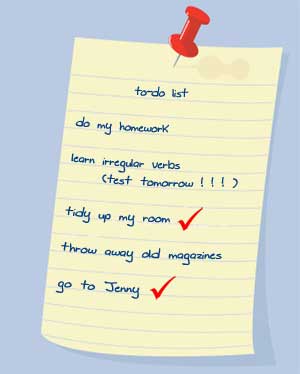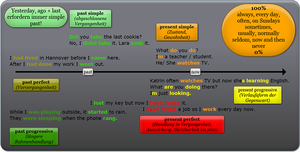Past Simple/Verneinung und Fragen: Unterschied zwischen den Versionen
K (Matthias Scharwies verschob die Seite Englisch/Grammatik/Tenses/Past Simple/Übung 3 nach Englisch/Grammatik/Tenses/Past Simple/Verneinung und Fragen: besserer, aussagekräftigerer Titel) |
(quiz aufgeteilt) Markierung: Quelltext-Bearbeitung 2017 |
||
| (13 dazwischenliegende Versionen desselben Benutzers werden nicht angezeigt) | |||
| Zeile 4: | Zeile 4: | ||
Write the verbs into the gaps. Choose if you need positive or negative statements. | Write the verbs into the gaps. Choose if you need positive or negative statements. | ||
{{Box|Tip:|The '''apostrophe''' ist next to the Enter-key. {{Taste|shift}} + {{taste|#}}|Merksatz}} | |||
[[Datei:Past 01.jpg|rechts|Illustration für Simple Past]] | |||
<div class="lueckentext-quiz" lang="en"> | <div class="lueckentext-quiz" lang="en"> | ||
Yesterday I finally ''tidied'' (tidy) up my room. I '' didn't throw'' (not, throw) away those old magazines under my desk. | |||
Then I ''went'' (go) to Jenny. We ''wanted'' (want) to work together. But we ''didn't do'' (not, do) the homework. We ''didn't learn'' (not, learn) the irregular verbs either. | |||
</div> | |||
<div class="lueckentext-quiz" lang="en"> | |||
When I ''came (come)'' home I ''started (start)'' to do it but then I ''didn't finish (not, finish)'' because my aunt came over. | |||
When I ''came (come)'' home I ''started (start)'' to do it but then I '' | |||
</div> | </div> | ||
| Zeile 21: | Zeile 23: | ||
Liz: You ''weren't (not, be)'' here at the weekend. Where ''did you go (you/go)'' ? | Liz: You ''weren't (not, be)'' here at the weekend. Where ''did you go (you/go)'' ? | ||
Tom: Oh, sorry! I ''didn't (not, tell)'' you before. We '' | Tom: Oh, sorry! I ''didn't tell (not, tell)'' you before. We ''were (to be)'' on a farm in the country.</div> | ||
<div class="lueckentext-quiz" lang="en"> | |||
Liz: Oh, that's nice. ''Did you enjoy (you/ enjoy)'' it? | Liz: Oh, that's nice. ''Did you enjoy (you/ enjoy)'' it? | ||
| Zeile 40: | Zeile 42: | ||
Tom: We all ''went (go)'' in the car. It's about two hours. | Tom: We all ''went (go)'' in the car. It's about two hours. | ||
</div><div class="lueckentext-quiz" lang="en"> | |||
Liz: And how long ''did you stay (you/stay)'' there? | Liz: And how long ''did you stay (you/stay)'' there? | ||
| Zeile 50: | Zeile 52: | ||
</div> | </div> | ||
{{Fortsetzung|vorherlink= | |||
weiterlink= | {{Fortsetzung|vorherlink=Past Simple/Irregular Forms|vorher=Irregular Forms| | ||
übersicht=Past Simple<br>(Übersicht)|übersichtlink=Past_Simple| | |||
weiterlink=Past_Simple/Kontrastierung| weiter=Kontrastierung (Gegenüberstellung)<br>von Simple Past und Simple Present}} | |||
| Zeile 57: | Zeile 61: | ||
{{SORTIERUNG:{{SUBPAGENAME}}}} | {{SORTIERUNG:{{SUBPAGENAME}}}} | ||
[[Kategorie: | [[Kategorie:Grammatik]] | ||
[[Kategorie:Interaktive Übung]] | [[Kategorie:Interaktive Übung]] | ||
[[Kategorie:Englisch]] | [[Kategorie:Englisch]] | ||
Aktuelle Version vom 11. April 2025, 09:00 Uhr
Fragen und Verneinungen mit did / didn't
My ToDo-List
Write the verbs into the gaps. Choose if you need positive or negative statements.
Yesterday I finally tidied (tidy) up my room. I didn't throw (not, throw) away those old magazines under my desk.
Then I went (go) to Jenny. We wanted (want) to work together. But we didn't do (not, do) the homework. We didn't learn (not, learn) the irregular verbs either.
When I came (come) home I started (start) to do it but then I didn't finish (not, finish) because my aunt came over.
What did you do last weekend?
Complete the conversation. For (???) find words of your own.
Liz: You weren't (not, be) here at the weekend. Where did you go (you/go) ?
Tom: Oh, sorry! I didn't tell (not, tell) you before. We were (to be) on a farm in the country.Liz: Oh, that's nice. Did you enjoy (you/ enjoy) it?
Tom: No, it wasn't (???) too great. It rained (rain) a lot. But I love all the little lambs and the ponies.
Liz: Did you ride (you/ride) one of them?
Tom: Yes, I did (???). I didn't want (not, want) to get down again.
Liz: Did (???) Sarah and Kim go with you?
Tom: No, they didn't (???). They stayed in Nottingham.
Liz: How did you get (you/get) there?
Tom: We all went (go) in the car. It's about two hours.
Liz: And how long did you stay (you/stay) there?
Tom: Just for the weekend. We went (go) on Friday evening.
Liz: When did you come (you/come) home?
Tom: About 9.30 last night. I didn't phone (not, phone) you because I was (be) really tired.
Past Tense:
Present Tense:





